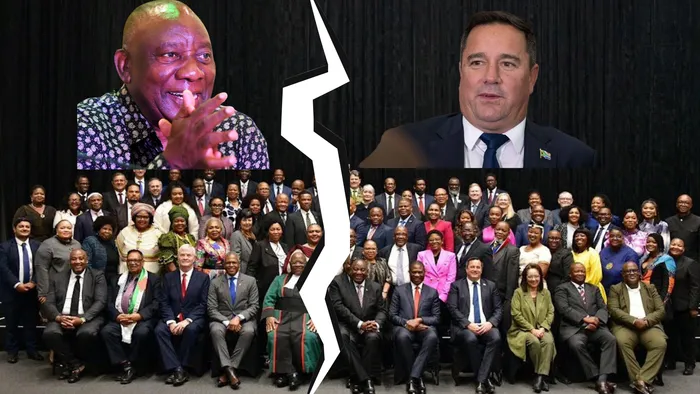Courtroom politics: The DA and ANC's complex relationship in South Africa

Tensions within the Government of National Unity (GNU) are reaching breaking point.
Image: IOL Graphic
The ongoing legal battles between the Democratic Alliance (DA) and the African National Congress (ANC) highlight a deeply entrenched relationship in South Africa’s complex political landscape. The recent court action taken by the DA against an ANC minister raises vital questions: Is the DA a partner of the ANC in a political theatre that detracts from real governance, or is it a reliable steward of accountability, prioritising the rule of law over political affiliations?
At first glance, these legal confrontations might seem typical of a competitive political climate. In a thriving democracy, a robust opposition is crucial for governing parties, ensuring accountability and transparency. However, the DA's ongoing inclination to resort to the courts could suggest something deeper: a strategy to leverage judicial mechanisms as political tools rather than genuine efforts for accountability. When the DA initiates court proceedings against ANC ministers, it argues that these actions are necessary for holding the government accountable.
The party claims to uphold democratic principles by challenging what it perceives as maladministration, corruption, or abuse of power. This perspective positions the DA as vigilant protectors of democracy—a role that garners public support and legitimacy. Yet, one could question whether this strategy forms part of a more significant alliance with the judiciary rather than merely being an opposition party. By frequently turning to the courts, the DA risks presenting itself as an alternative political choice and a quasi-judicial body.
Critics argue that this approach can undermine public trust in both the political and judicial systems, leading citizens to view the DA less as a political party serving their interests and more as a factionally driven entity circumventing the political process. Moreover, resorting to the courts can unintentionally absolve the ANC from political accountability. If the DA successfully leads the charge on governance issues through litigation, the ANC may avoid answering questions in the public domain, instead relying on legal disputes to shape narratives. This dynamic could lead to political co-dependency, where both parties engage in a cyclical pattern of litigation and counter-litigation, distracting from the pressing needs of constituents who reside outside the courtroom's walls.
The DA’s focus on legal solutions can also lead to criticisms regarding its effectiveness as a political party. Instead of working actively to build coalitions, mobilize grassroots support, and address social issues such as poverty and inequality, the party risks appearing disengaged from South Africans' everyday struggles. For many citizens, the day-to-day challenges include unemployment, crime, and inadequate healthcare—areas where meaningful policy proposals and outreach could effect change more immediately than a courtroom judgment.
Additionally, the DA’s frequent court interventions may alienate some of its potential supporters, particularly those who are fatigued by political infighting and desire demonstrable results. In a nation grappling with socio-economic disparities, a focus on legal battles can come across as detached from the reality ordinary citizens face. Furthermore, the perception of the DA as an antagonistic force can create division rather than unity in a society that needs collaborative solutions. In such a racially and economically diverse nation, an approach grounded in litigation could cultivate resentment rather than build bridges among different demographic groups. The need for coalition-building and dialogues around policy formulation becomes clearer in the face of such divisions; these efforts will yield better long-term benefits than court cases. There's also the question of the integrity of South Africa's judicial system.
While a sound judiciary is essential for democracy, overreliance on legal action by political parties can politicize the courts. The judiciary, considered a neutral arbiter, must not be perceived as a tool for political vendettas. The DA's cases against the ANC must focus on genuine legal violations rather than serving strategic party objectives.The DA's role in taking legal action against ANC ministers merits critical examination. While holding the government accountable is essential, it is paramount for the DA to re-evaluate its strategies. The party must ensure that its approach promotes genuine political discourse, prioritizes citizen engagement, and addresses the immediate needs of the South African populace.
By ensuring a balance between legal accountability and substantive political engagement, the DA can strengthen its role not as a purported partner to the ANC or the courts, but as a dedicated advocate for the people it seeks to represent. Moving beyond the courtroom and into substantial policy discussions will ultimately serve both the DA and the South African public better. A legislative focus that intertwines the party's accountability ethos with a genuine commitment to addressing systemic challenges could pave the way for a more just, equitable, and united South Africa—one where political battles are fought in the arena of ideas, not merely within the confines of legal proceedings.